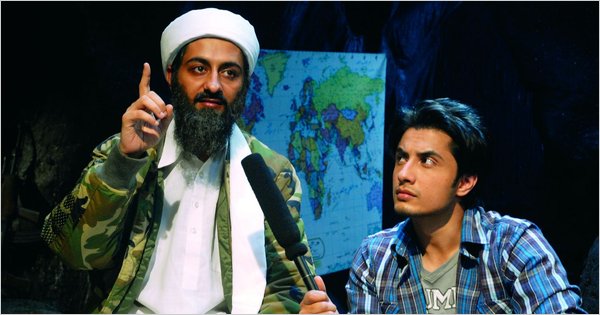
If critiqued simply on its cinematic merits, the new Indian movie, Tere Bin Laden (Without You, Laden), would probably earn a below average rating. Lacking the big name stars and slick production values of today’s Bollywood movies, the film only barely escapes the look and feel of a homegrown project.
Yet, neither the choppy editing nor the mediocre cinematography stands in the way of this radical indie movie. A satirical take on the ‘War on Terror,’ the story is that of an ambitious young reporter who, in his quest to earn his way to a phony passport into America, tricks a hapless Osama look-alike into making a fake “jihadi” tape. The tape, which contains dire warnings to America, triggers panic around the world, resulting in some unanticipated consequences for the hero and his motley crew.
Even without the controversial storyline, the film earns its radical chops simply for being a completely Indian production on a story entirely based in Pakistan (though it was shot in India and has a mostly Indian cast and crew). With a simple concept, the filmmakers accomplish what the American military has long hoped to – defanging the cult of the world’s most fearsome terrorist by rendering him as a bumbling farmer whose life’s passion is his impressive collection of chickens. The character is so endearing, you almost want the filmmakers to launch a line of soft toys with the Osama doppelganger and his beloved rooster.
Tere Bin Laden succeeds because it gets its audience thinking about the bizarre inconsistencies of a conflict that has become the defining event of our generation. For instance, here is America spending billions to defeat terrorists, many of whom are indirectly supported by America itself, thanks to America’s “War on Terror” ally, Pakistan. On the other side is the subject of America’s ire, the black sheep of a Saudi family that made its fortune thanks to American largesse and whose skills were actually cultivated by the CIA.
Whether it’s the idiosyncrasies of the War on Terror, American and Pakistani ham-handedness or Bin Laden’s rabid ideology, the film satirizes them with a gentleness that causes the least amount of offense possible. Yet there is no mistaking its mild rebuke – the decisions of a few impact the lives of the millions caught in the middle.
The movie has been well received by critics in India and the U.S. and has made a sizable profit. Unfortunately, Pakistan’s censor board banned the movie because it caricatures Bin Laden and Pakistani security agencies. Ostensibly, officials fear that the film could trigger violent attacks from extremists. The Indian filmmakers have embraced the ban with a cheerful gusto; posters now feature the label “officially banned in Pakistan” as a badge of honor.
Despite the ban being largely ceremonial (pirated Bollywood DVDs are all the rage in Pakistan), it is still somewhat of a dampener. While this may sound like a cliché, the movie holds the promise of reducing the divide between ordinary Indians and Pakistanis. The fact that this Bollywood production is completely about Pakistan and features a Pakistani pop singer, Ali Zafar, in its lead, is likely to warm many a Pakistani heart. Letting the film play in Pakistani theaters would have been a good reciprocatory gesture of goodwill on the part of the government.
For Indians, rarely has any movie, let alone an Indian one, done this much to provide a snapshot into the lives of ordinary Pakistanis. Its hard not to watch the movie without the realization that these people look, speak and behave like your countrymen and women. Indeed, as I was watching the movie, the resemblance to daily life in India was almost uncomfortably similar in the beginning. The feeling slowly vanished as I began to enjoy the madcap story and forgot all about which country this was based in.
The film ends on a high note – [Spoiler Alert] – the hero gets the fake Osama to make another video declaring a cessation of hostilities. The War on Terror is over, our hero fulfils his long cherished dream of making it to the US, and peace reigns. It’s a naïve ending, but you cant help cheering as “Osama” finishes his video to George Bush with a flourish – “Lets make peace, Bush,” he says. “yours truly, Osama.”